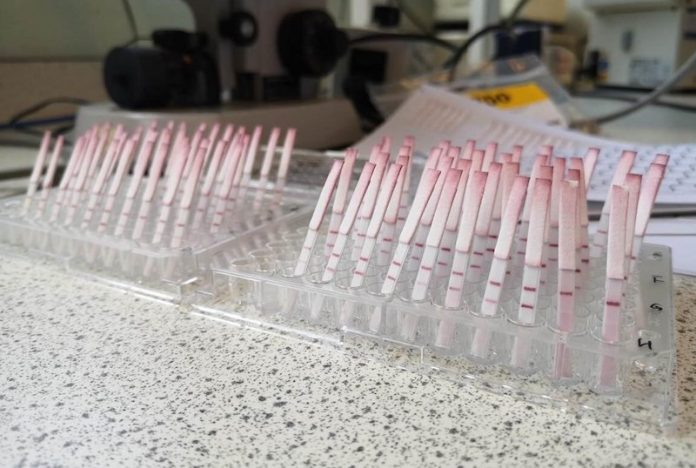
In a new study, researchers found a new diagnostic test could provide rapid, inexpensive testing of COVID-19.
The research was conducted by a team at the University of Southampton.
Current testing using the standard PCR test requires samples to be sent to a laboratory which means results are not available until one or two days later.
The new test can detect the presence of the SARS-CoV-2 virus which causes COVID-19 in 10-15 minutes.
The test involves taking a patient’s nasal swab and mixing it with a solution in a tube.
Working in a similar way to the commonly available pregnancy test, a paper strip containing a capture antibody is then dipped into the tube to absorb the solution.
As the liquid moves up the strip, a red line will appear if the virus is present in the sample.
The University’s Faculty of Medicine have carried out trials using 150 patient swabs, 125 of which had tested positive with a PCR test and 25 that had tested negative.
The results showed the new product can reliably detect COVID-19 in individuals with moderate to high viral levels, the most infectious patients.
The team is now in discussions with manufacturers who would be able to produce the test at scale and begin the process for obtaining the necessary regulatory approvals.
If the product is widely produced it could be rapidly deployed to clinics and GP surgeries as a point-of-care test which would relieve the high demand currently being experienced by PCR testing centers.
The low cost of the product could also pave the way for large-scale testing of individuals in schools, airports, or businesses.
The team says the key strength of the test is that it can be used at home by anyone, making daily testing of the population an achievable reality.
The individuals whose samples were identified as positive by this test would be the ones more likely to spread the disease because of their high viral loads.
One researcher of the study is Dr. Collin Sones.
Copyright © 2020 Knowridge Science Report. All rights reserved.



